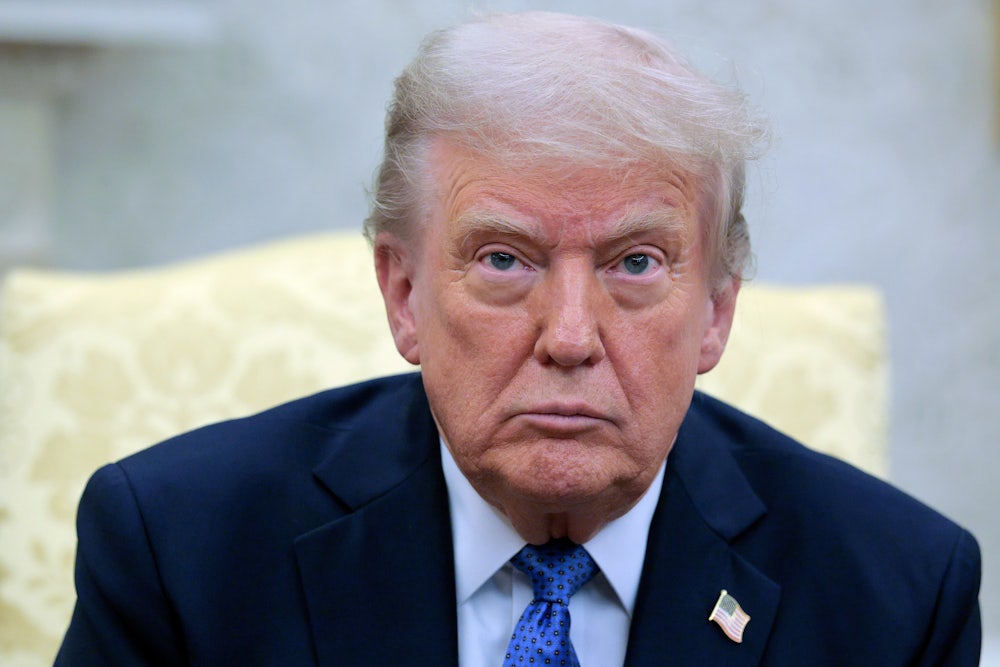Just over a month ago, President Donald Trump was more popular than he was at any point in his first term. This was especially troubling because his administration was proving to be even more incompetent, corrupt, and authoritarian this time around. He was busy gutting the civil service, defying judicial orders, and creating migrant concentration camps abroad—but Americans didn’t seem to mind. Trump’s surprisingly resilient approval ratings had Democrats wondering, after his election gains with people of color and in blue redoubts like New York City and Detroit, whether anything could pull him down.
What a difference a month makes. “Liberation Day,” Trump’s announcement of massive tariffs on pretty much every other nation in the world, may go down as the biggest own goal in American—and perhaps global—political history. Trump is now less popular than any president has been at the 100-day mark in 80 years. In a new NPR survey that asked respondents to grade Trump (like the schoolchild that he is), 45 percent—including more than half of independents—gave him an “F,” while just 23 percent gave him an “A.”
This is a shocking slide, and Trump seems to know it: He mused on Monday about launching criminal prosecutions against pollsters. But Trump’s chances of bouncing back are remarkably slim. That 23 percent of NPR respondents who gave him an “A” may very well represent his floor. If things continue on this trajectory, his approval rating may fall to that number, making him the least popular president in the country’s history.
In the very best scenario—for Trump, at least—“Liberation Day” would be analogous to what the chaotic U.S. withdrawal from Afghanistan was for Joe Biden’s popularity. After that debacle, Biden’s popularity rapidly slid and never recovered. Americans may have wanted to leave Afghanistan, but they clearly had expectations that we would not leave the country in the Taliban’s hands and strand many Afghans who had aided the American occupation. The fallout (and the relentlessly negative media coverage) led to the impression that Biden was weak, infirm, and incapable of leading—a perception that would ultimately doom not only his presidency but the Democrats’ hopes of holding onto the White House.
“Liberation Day” seems to have woken a lot of Americans up to something they had inexplicably forgotten: Trump is the same profoundly incompetent and stupid person who, just a few years ago, they did not like very much. Trump may be counting on his trade war somehow working, but much would have to go right for his popularity to recover. For one, that trade war would have to deliver what Trump promises it will: mass prosperity, an end to the income tax, and the return of well-paying manufacturing jobs—which pretty much everyone, aside from Trump and a handful of slavish loyalists, agrees is impossible. He would also have to somehow turn back time and restore the pre-Covid economy that many Americans remembered so fondly when they voted for him a second time. This is also impossible. He would probably also have to end the war in Ukraine—but in a way that doesn’t give Russia everything it wants, which is Trump’s current, and truly artless, negotiating position—and somehow repair America’s absolutely destroyed global reputation. None of that is going to happen, either.
It’s more likely that everything is going to get a lot worse. Trump’s approval ratings are historically awful right now, even though he has managed to delay the worst effects of his trade war. But he is still stubbornly clinging to tariffs, which inevitably will cause product shortages and rising costs in the near future—not to mention a potential recession, the odds of which are worryingly high.
A lot of other things will likely hurt his popularity too. Trump seems to believe that ending the war in Ukraine will win him a Nobel peace prize, but while Americans may have soured on supporting that nation’s fight against Russian invaders, a deal that ends up being a gift to Putin may not go down well with independents or even Republicans (and certainly won’t with Democrats, though they basically already all despise him anyway). His authoritarian immigration crackdown is already unnerving a majority of voters, and those numbers will likely continue to slide as his administration deports law-abiding undocumented immigrants and even legal residents and citizen children. That crackdown, moreover, is rapidly heading toward a confrontation with the judiciary and the Supreme Court that seems destined to lead to a constitutional crisis.
His administration, meanwhile, will likely continue to be beset by smaller crises that will further drive down his approval rating. His secretary of defense, Pete Hegseth, is completely out of his depth and has shared military strike plans with nonauthorized personnel on a number of occasions. His secretary of health and human services, Robert F. Kennedy Jr., is an anti-vax nutjob who is presiding over the largest measles outbreak in decades. Funding has been cut for the Social Security Administration and the Food and Drug Administration. It’s easy to imagine a near future where communicable diseases are spreading rapidly, Social Security checks aren’t going out, and E. coli outbreaks are common—all while prices are rising and the country is in a recession.
The bad news for the growing ranks of people who see Trump as an incompetent buffoon at best and a threat to the constitutional order at worst is that we’re only 100 days in. This administration has a very, very long time left in power. It is hard to imagine how the damage Trump has done in the last three months will be undone, and it’s scary to imagine how much more destruction he can wreak in the 1,350-ish days he has left in power. But Americans seem to be waking up to the fact that they have elected a ruinous madman. The only question remaining is whether he’s a sort of kamikaze president—willing to crash and burn his popularity in order to wreak maximum destruction on his enemies—or somehow can be convinced to pull this country back from the brink of total disaster.








